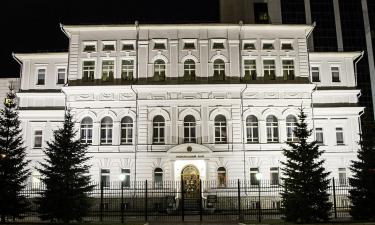More than 500,000 people in Pakistan can die from hypothermia
More than 500,000 people in northern Pakistan, the world's most mountainous region, haven't been reached and are in danger of dying from hypothermia after the Oct. 8 earthquake, the United Nations said.
Reaching the survivors of the earthquake, which killed more than 42,000 people in Pakistan and India, is one of the ``toughest challenges'' relief workers have ever faced, the UN World Food Program Executive Director James Morris said.
``At the best of times this is very difficult terrain, but with landslides blocking roads, plus the onset of winter, getting to these people is taking far longer,'' Morris said late yesterday in Dubai. ``And there is very little time left.'' As many as 3.3 million people are homeless after the magnitude 7.6 earthquake, which left more than 67,000 injured. The scale of the disaster in the divided region of Kashmir has prompted Pakistani President Pervez Musharraf to offer to open the border with India to allow relatives to reach each other.
``In this time of need, we are ready to allow the relatives divided by the line of control to meet each other, console each other and help in rebuilding their houses,'' Musharraf said in a televised speech to the nation last night. He didn't elaborate.
``India is willing to facilitate such movements but we await word from Pakistan about the practical details of implementing this intention,'' India's Ministry of Home Affairs said in a statement late yesterday.
Temperatures are falling to below freezing and hypothermia is a risk for people sheltering under plastic sheeting in Kashmir, the UN said. Injured people are still coming down from higher places and many have gangrene.
Aftershocks continue to rattle the region, disrupting aid efforts. A magnitude 5.8 aftershock struck this morning in the vicinity of the main quake, the U.S. Geological Survey said on its Web site. The tremor was felt in Islamabad and sent people into the streets in panic.
A 5.1 magnitude aftershock was felt 30 minutes later, Ghulam Rasul, a spokesman for Pakistan's Meteorological Department in Islamabad, said by telephone. Aftershocks have become less intense, and the frequency of the tremors has fallen from 100 a day to 30 to 40 a day, he said. Pakistan urgently needs 260,000 tents and 2 million blankets for the survivors, General Farooq Ahmed, who is overseeing the country's earthquake relief operation, told reporters in Islamabad yesterday.
Supplies of anti-tetanus vaccine are also needed to treat the injured, he said. Only 20,000 tents designed for winter conditions have been delivered out of 300,000 needed, the UN said on Oct. 17, reports Bloomberg. I.L.
Subscribe to Pravda.Ru Telegram channel, Facebook, RSS!




